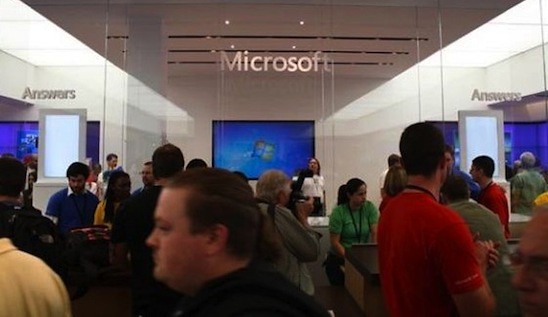
One of the integral components of Apple’s resurgence under Steve Jobs has been the company’s retail strategy. Though the ubiquity of Apple retail stores may make it easy to forget, it really wasn’t all that long ago that Apple products were hard to find, and often displayed haphazardly in stores like CompUSA and Office Depot where store employees typically knew little to nothing about the products emanating out of Cupertino.
Apple’s retail strategy under the guidance of Ron Johnson has since worked wonders. Starting in 2003, Apple started constructing elegant retail stores and began placing them in heavily foot-trafficked areas. For the first time, Apple was able to control the narrative of the Apple buying experience and deliver its products to the masses without having to rely on third party retailers to get the job done. Since then, Apple stores have served as a key ingredient in Apple’s success and have become the most profitable retail store per square foot in the world, even surpassing Tiffanys.
Looking to mimic Apple’s retail success, Microsoft in late 2009 announced its own plans to open up a chain of Microsoft retail stores, beginning with locations in California and Arizona. Since then, Microsoft’s retail presence has quietly expanded to include eight stores in total, but rumor has it that there’s a heated debate raging on within Microsoft over how aggressively the company should pursue an expansion of its retail strategy.
Citing sources close to the company, Business Insider reports that CEO Steve Ballmer and COO Kevin Turner are keen on not only matching, but even surpassing Apple’s total of ~300 retail stores.
The problems with Microsoft’s retail expansion plans are numerous, and in many ways, emblamatic of classic Microsoft under-thinking.
For starters, Apple’s retail stores were built up once they proved to be successful and extremely profitable. Microsoft’s retail stores, word has it, haven’t really been raking in the dough.
Second, there was a discernible need for Apple retail stores. Where else were you gonna find Apple products, after all? In contrast, there are no shortage of places to find Microsoft products and Microsoft’s retail strategy is essentially an answer for a problem that doesn’t exist. Accessibility isn’t an issue for Microsoft, the lack of compelling products is. Sure, the company has the Xbox, and the Kinect add-on has been selling like hot cakes, but aside from that, what can Microsoft really offer besides Windows Phone 7 and an assortment of hardware from various OEMs? At the end of the day, Microsoft can spruce up its retail stores and fill it with whatever fancy schmancy products they want, but if they’re not making money, there’s really no point.
If Microsoft tried to open 100 stores per year, capital expenditures would climb and investors would scream — they’re already frustrated with the money Microsoft has spent on its datacenters over the last five years and its financial losses in search against Google.
As a result, Ballmer has been convinced to hold back. But if the stores start to turn the corner — or if Microsoft decides it needs a retail footprint to sell products like Windows Phone 7, which compete for shelf space in places like the AT&T store, then the company could ramp up.
Agressive and unwarranted over expansion is typically one of the worst things a company can do. Just ask Einstein Bagels and Borders.





Wed, Apr 6, 2011
Analysis, News